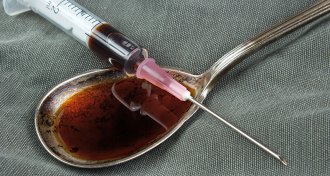Scicurious
A peek behind the science curtain
Sign up for our newsletter
We summarize the week's scientific breakthroughs every Thursday.
-
 Neuroscience
NeuroscienceHow a fat hormone might make us born to run
Many runners finish long races in a euphoric mood. The underpinnings of this runner’s high may involve many chemicals, including the fat hormone leptin.
-
 Health & Medicine
Health & MedicineWith flibanserin approval, a complicated drug takes the spotlight
The Food and Drug Administration has approved the first drug to increase women’s sexual desire. But whether the benefits outweigh the side effects depends on who you ask.
-
 Neuroscience
NeuroscienceThe need to feed and eating for pleasure are inextricably linked
Scientists used to think that the hunger and the pleasure from food could be easily distinguished. But new results show these systems are inextricably intertwined.
-
 Health & Medicine
Health & MedicineBuilding standards aren’t to blame for chilly offices
A recent study made headlines for finding differences between men and women in comfort level for heating and cooling. But that’s not why women are cold in the office.
-
 Health & Medicine
Health & MedicineHow trans fats oozed into our diet and out again
Trans fats are no longer “generally recognized as safe” by the FDA. In a world where we want to have our doughnuts and eat them, too, it’s back to the drawing board, and back to butter.
-
 Health & Medicine
Health & MedicineThe weekly grind of social jetlag could be a weighty issue
Even those of us with nine-to-five jobs don’t always respect our body’s clocks. Research shows that even slight disruptions might be associated with obesity.
-
 Life
LifeShifted waking hours may pave the way to shifting metabolism
Shift workers are at higher risk for obesity and metabolic problems. Scientists are working hard to understand why the night shift makes our hormones go awry.
-
 Life
LifeWomen blush when ovulating, and it doesn’t matter a bit
Women don’t signal their fertility in obvious ways like nonhuman primates. A new study shows that even skin flushes are too subtle to detect.
-
 Science & Society
Science & SocietyNo matter the language, disease risk is hard to communicate
Reassuring messages about MERS might seem designed to stop panic. But in reality, people need to hear the truth, even if it’s uncertain.
-
 Psychology
PsychologyThe guilty pleasure of funny cat videos
Many people love posting and looking at cute kitty content online. A new survey shows that this could be because it helps us manage our emotions.
-
 Science & Society
Science & SocietyHome-brewed heroin: Hold the hype
Now is the time to think about policy for synthetically produced morphine, but the process, if it bears out, is years away from working.
-
 Neuroscience
NeuroscienceDiet and nutrition is more complex than a simple sugar
A new study shows that fructose may leave you wanting more when compared to the same dose of glucose. But in studies of single nutrients, it’s important to be cautious.